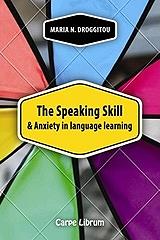THE SPEAKING SKILL AND ANXIETY IN LANGUAGE LEARNING (BKS.0147012) 
Κατόπιν παραγγελίας
Σταθερά Χαμηλές Τιμές! Εδώ θα βρείτε κάθε μέρα τις πιο ανταγωνιστικές τιμές
Κατηγορία: ΕΚΜΑΘΗΣΗ ΞΕΝΩΝ ΓΛΩΣΣΩΝ •
ΔΡΟΓΓΙΤΟΥ ΜΑΡΙΑ στην κατηγορία ΕΚΜΑΘΗΣΗ ΞΕΝΩΝ ΓΛΩΣΣΩΝ ISBN: 978-618-5186-06-7 Συγγραφέας: ΔΡΟΓΓΙΤΟΥ ΜΑΡΙΑ Εκδοτικός οίκος: CARPE LIBRUM Σελίδες: 244 Διαστάσεις: 17Χ24 Ημερομηνία Έκδοσης: Μάρτιος 2016 As language pedagogy continues to move towards an emphasis on authentic communicative competence and a communicatively oriented classroom, anxiety-provoking threats become higher when students are asked to speak in front of others. This course of events seems natural if we take into account that in foreign language classrooms, the students have to cope with the demands of being able to sustain communication by means of an instrument they are not completely familiar with. Since anxiety is known to have a harmful effect on language learning and performance, a good deal of research has been devoted to it in recent years, confirming what most people would regard as intuitively true, "that learners with low anxiety will learn better" (Ellis, 1994: 482). Therefore, language anxiety deserves to be the subject of enquiry because it is correlated to low proficiency. Research has shown that language anxiety is a significant problem in language classrooms throughout the world especially in terms of its strong relationship to the skill of speaking in a foreign or second language. Seeking to shed further light on the issue of language anxiety, the main concern of this book is to find out how anxiety is manifested in the Greek Senior High school learners, which factors students believe that contribute to anxiety, whether language anxiety is directly associated with specific types of activities or with instructors΄ behaviours and how they cope with their second language anxiety, especially in reference to the results of questionnaires which were administered and to their self-reflective accounts of emotional difficulties encountered in the Greek state school, as revealed at interviews. The outcomes of this study may provide some alternative insights into the relationship between language anxiety and oral performance and help to identify the roles of teachers in reducing the language anxiety of these students. | ||||||||||||||||||||||||||||||||||||||||||||||




